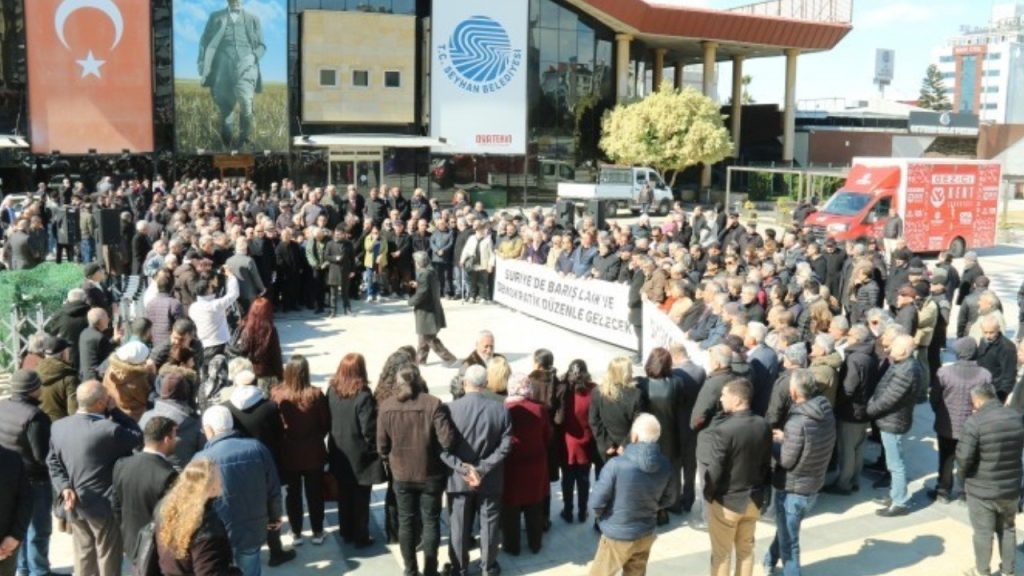On February 22, activists in Adana’s Seyhan district organized a protest and press conference to spotlight human rights violations faced by Alevi and other religious communities in Syria following the ouster of President Bashar al-Assad. The event was marked by speeches from Alevi leaders and civil society organizations, demanding immediate national and international intervention to halt ongoing violence and oppression. This gathering came in the wake of alarming reports documenting severe abuses such as torture and executions attributed to the Sunni-Islamist group Hay’at Tahrir al-Sham (HTS) since the beginning of December 2024.
| Article Subheadings |
|---|
| 1) Protest Against Human Rights Violations |
| 2) Alevi Leaders Demand Unity |
| 3) Political Responses and Criticism |
| 4) The Role of HTS in the Current Crisis |
| 5) Sectarian Violence and Broader Geopolitical Implications |
Protest Against Human Rights Violations
On February 22, the Alevi Civil Initiative convened a significant protest in Adana’s Seyhan district, focusing on alarming human rights abuses targeting Alevi and other religious communities in Syria. The demonstration included a press conference where numerous leaders from the Alevi community, civil organizations, and political parties voiced their concerns over the ongoing violence. The protest followed the ousting of President Bashar al-Assad on December 8, 2024, by Hay’at Tahrir al-Sham (HTS), a Sunni-Islamist group that has been accused of committing various forms of brutality, including torture, against those deemed as opposition. The community’s leaders emphasized that these acts have steadily increased, creating an atmosphere of fear and instability.
Alevi Leaders Demand Unity
During the protest, Mustafa Aslan, the Chair of the Alevi Bektaşi Federation (ABF), urged unity among all communities against sectarian conflicts. He articulated a profound need for peaceful coexistence and tolerance among Syria’s diverse populations, stating their shared humanity must prevail over divisive sectarian narratives. This call for unity resonated throughout the rally as speakers highlighted the importance of cooperation among the Alevi and Alawite groups in facing common threats. Moreover, Alevi leaders specifically called upon the Turkish government to intervene and provide support to those suffering in Syria.
Political Responses and Criticism
The plight of Alevi communities has not gone unnoticed by political figures. Müzeyyen Şevkin, a lawmaker representing the main opposition Republican People’s Party (CHP), linked the recent violence to deeper energy conflicts gripping the Middle East. She asserted that the massacres occurring in the region cannot be viewed in isolation, as they are intricately tied to a series of geopolitical struggles. Her remarks underscore the interconnected nature of sectarian violence and political dynamics, which further complicate efforts to create a peaceful resolution. Leaders from various political factions joined in condemning the current situation and pushing for proactive measures to protect Alevi communities.
The Role of HTS in the Current Crisis
Following HTS’s rise to power in December 2024, the group has been widely criticized for its intolerance and oppressive actions against Alevi communities. Activists argue that these actions have escalated since HTS’s establishment of control. According to statements from community leaders, HTS exemplifies the kind of sectarianism that threatens the very fabric of Syrian society. Reports indicated that military operations conducted in late January 2025 resulted in substantial casualties, with at least 35 individuals killed and over 40 others reported as forcibly disappeared, echoing earlier fears regarding the group’s impact on minority populations.
Sectarian Violence and Broader Geopolitical Implications
The repercussions of these sectarian attacks extend beyond the immediate violence they inflict on communities. The ongoing conflict in Syria has drawn attention to the delicate balance of power in the region, where different sects vie for dominance. The Alevi community, while a minority in Syria, is one of the larger religious groups following Sunni and Shia Muslims. The impact of the ongoing violence on this community also highlights broader concerns regarding stability within Syria. Critically, the Syrian Observatory for Human Rights (SOHR) has documented a worrying trend of increased sectarian attacks since the demise of Assad’s regime, suggesting that the conflict is increasingly manifesting along sectarian lines.
| No. | Key Points |
|---|---|
| 1 | The protest in Adana was organized by the Alevi Civil Initiative to highlight human rights abuses faced by Alevi and other religious communities in Syria. |
| 2 | Community leaders called for unity among diverse Syrian groups to combat rising sectarian violence. |
| 3 | Political representatives emphasized that the violence is connected to larger geopolitical conflicts in the region. |
| 4 | Hay’at Tahrir al-Sham’s actions have exacerbated violence against minority groups, leading to severe human rights violations. |
| 5 | The ongoing sectarian violence poses significant risks to the stability and future of Syrian society. |
Summary
The events in Adana underline the urgent need for attention to the human rights situation faced by Alevi and other communities in Syria. As the political landscape in the region continues to shift, the outcry from these communities serves as a vital reminder of the ongoing struggles against sectarian violence. The commitment to unity and calls for intervention reflect a broader desire for peaceful coexistence and highlight the complex interplay of local and geopolitical factors that continue to influence the human rights landscape in the region.
Frequently Asked Questions
Question: What is the primary concern of the Alevi community regarding the situation in Syria?
The Alevi community is primarily concerned about ongoing human rights abuses, including torture and executions, that have intensified following the fall of President Bashar al-Assad and the rise of Hay’at Tahrir al-Sham.
Question: How have political representatives responded to the increasing violence against Alevi communities?
Political representatives have highlighted the link between the violence and broader geopolitical struggles in the Middle East, advocating for intervention to protect marginalized groups.
Question: What actions have been called for by Alevi leaders in response to the crisis?
Alevi leaders have called for unity among diverse communities in Syria and urged the Turkish government and international authorities to take decisive action against human rights violations.


